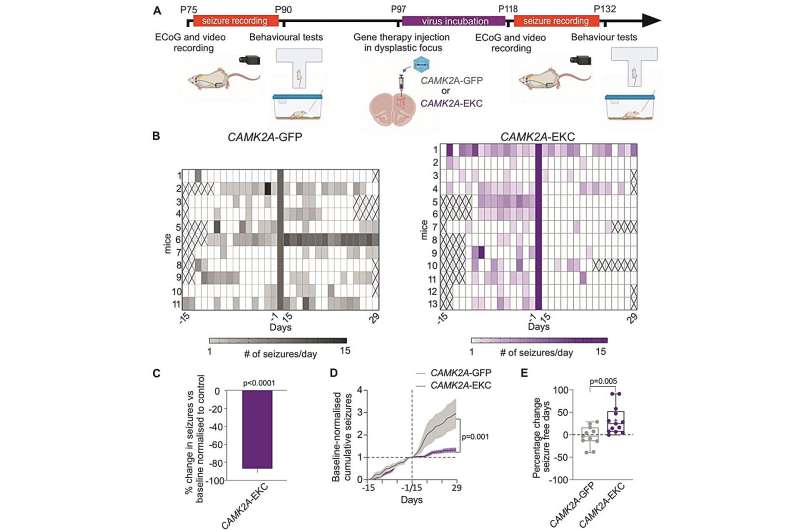This article has been reviewed according to Science X's editorial process and policies. Editors have highlighted the following attributes while ensuring the content's credibility:
fact-checked
peer-reviewed publication
trusted source
proofread
New gene therapy could significantly reduce seizures in severe childhood epilepsy

UCL researchers have developed a new gene therapy to cure a devastating form of childhood epilepsy, which a new study shows can significantly reduce seizures in mice.
The study, published in Brain, sought to find an alternative to surgery for children with focal cortical dysplasia.
Focal cortical dysplasia is caused by areas of the brain that have developed abnormally and is among the most common causes of drug-resistant epilepsy in children. It frequently occurs in the frontal lobes, which are important for planning and decision-making. Epilepsy in focal cortical dysplasia is associated with comorbidities, including learning disabilities.
Although surgery to remove the affected brain malformation is effective, its use is severely limited by the risk of permanent neurological deficit and does not always result in seizure freedom.
Consequently, researchers at the UCL Queen Square Institute of Neurology evaluated a gene therapy based on the overexpression of a potassium channel that regulates neuronal excitability in a mouse model of focal cortical dysplasia in the frontal lobe.
Potassium channels control the movement of potassium ions in and out of cells. When there is an overexpression of a potassium channel, it means that there is greater regulation, resulting in the decrease of the activity of cells and, in turn, stopping seizures.
Co-corresponding author Professor Gabriele Lignani (UCL Queen Square Institute of Neurology), said, "It is very exciting to see that this new gene therapy could potentially be used as an effective alternative to surgery in patients with focal cortical dysplasia."
Gene therapies have previously been shown to work in another form of epilepsy where seizures arise in the temporal lobes but have not been tested in focal cortical dysplasia.
In this case, the researchers introduced an engineered potassium channel gene called EKC into the affected frontal lobe of the epileptic mice. For added safety, they used a virus that is unable to replicate in order to carry the potassium channel gene.
Before giving the treatment, researchers monitored the mice's brain activity for 15 days. They then injected either the virus carrying the EKC gene or a control virus into the affected brain area. The team then monitored the mice's brain activity for another 15 days.
The researchers found that gene therapy reduced seizures by an average of 87% when compared with the control group, without affecting the mouse's memory or behavior.
Lead author Dr. Vincent Magloire (UCL Queen Square Institute of Neurology) said, "Following the successful study in mice, we believe the treatment is suitable for clinical translation, and, taking into account the size of the unmet need, it could be deployed to thousands of children who are currently severely affected by uncontrolled seizures."
Co-corresponding author Professor Dimitri Kullmann (UCL Queen Square Institute of Neurology) added, "Plans for a first in human clinical trial are underway and are planned in the next five years."
More information: Amanda Almacellas-Barbanoj et al, Anti-seizure Gene Therapy for Focal Cortical Dysplasia, Brain (2023). DOI: 10.1093/brain/awad387





















